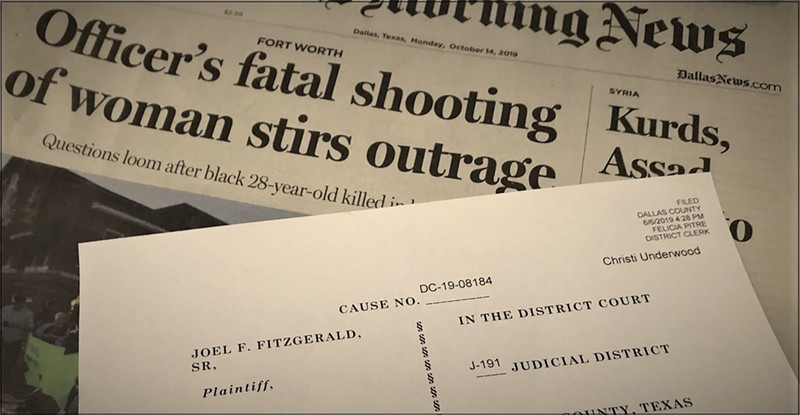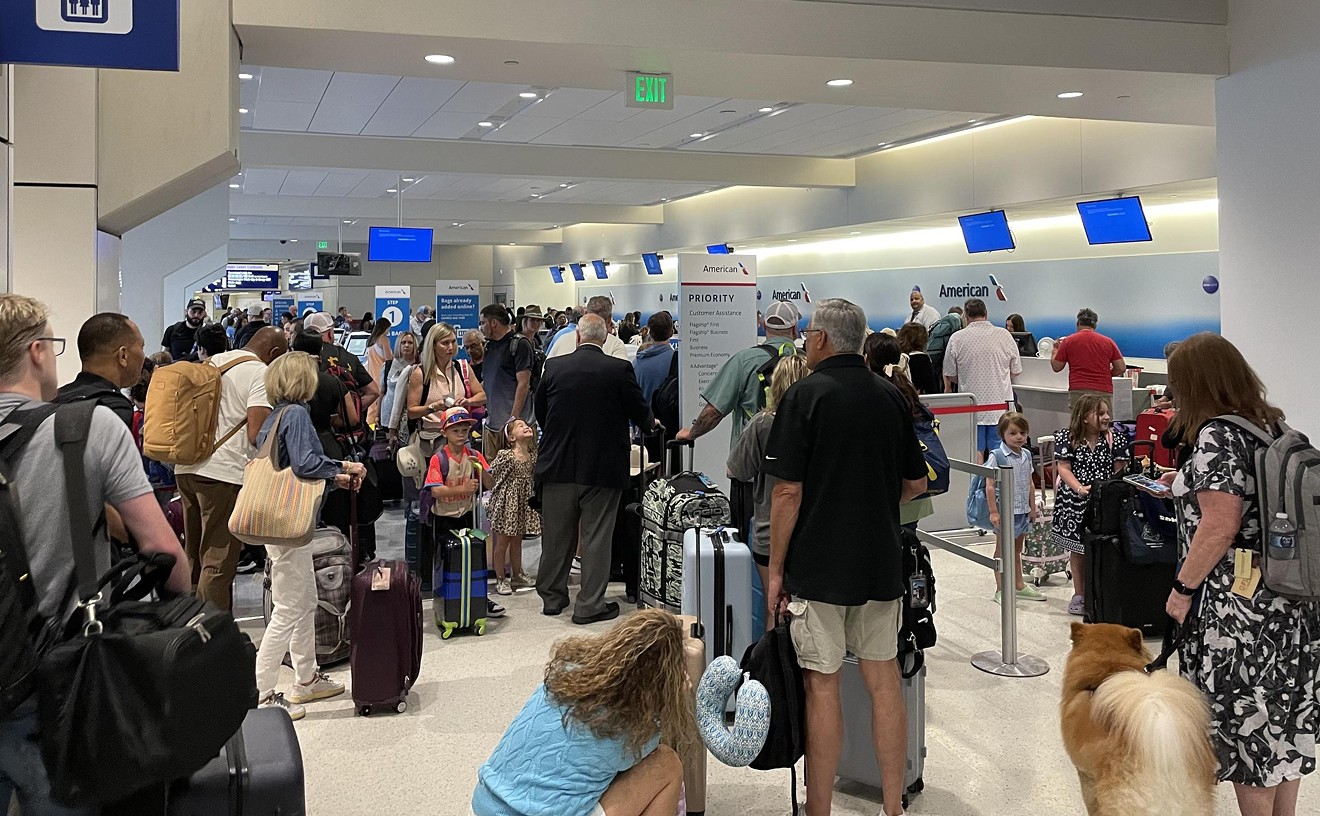Either Fitzgerald was a crazy control freak who couldn’t control himself in public settings, as the city alleges. Or Fitzgerald was a consummate professional with a doctorate trying to bring discipline and racial awareness to the Wild West, as his lawsuit claims.
The answers to the questions raised in his suit were important when the suit was filed, but they are much more important now. At a press conference Monday following the weekend shooting, the mayor, city manager and interim chief of police all aggressively distanced themselves from the action of former officer Aaron Dean, who had resigned earlier that day.
Dean is accused of shooting Jefferson through a bedroom window in response to an “open building” or possible break-in call from his dispatcher. Fort Worth police went to the house in response to a call from a neighbor who was concerned because a door to the house was open late at night.
Given how early it was in the investigation, officials at the press conference were unusually assertive about separating themselves from the former officer’s behavior. But when did they achieve that distance?
Have they always supported the de-escalation training, strict discipline and diversity policies that might have made this less likely to happen? Or did they get religion just in time for the press conference?
“Had Dr. Fitzgerald been reinstated months ago, Atatiana would be alive today, and the number of police shootings would not be in double digits.” — Stephen Kennedy
tweet this
It’s the kind of question that usually comes down to one side against the other, people on both sides making competing claims that can’t be proved, but this is a little different. The answers to all of these questions about Fort Worth — not just the police department but the whole of City Hall — could be answered, theoretically, if we could just get to the bottom of Fitzgerald’s lawsuit.
Of big cities in Texas, Fort Worth has always been the ultimate insider good-ol’-boy town. When it named Fitzgerald as the new chief of police in 2015, he was the ultimate outsider and not a good ol’ boy at all. He’s a Yankee from Philadelphia. He has a doctorate in business administration. And he’s black, the city’s first African American chief.
When the city sent him a memo firing him on May 20, 2019, the language had a lot to do with his not fitting in: “Because of your increasing lack of good judgment as the Police Chief of the City of Fort Worth, we have lost confidence that you can be a trusted member of the City’s Management team.
“You have a track record of making decisions that are more focused on your best interest instead of the best interest of the city, the organization or department as a whole.”
There was a more specific allegation that Fitzgerald had embarrassed the city by speaking harshly to a Texas police union official at an event in Washington, D.C. Two chiefs of police of major cities and a Fort Worth police chaplain, all witnesses to the alleged event, say it didn’t happen. And, anyway, who cares? The whole thing sounds like a dispute in a fraternity house.
In his suit against the city, Fitzgerald ticks off a list of things about himself that he believes bothered city officials way more than whether he did or did not dis a state union official (he says he did not). And this is where we get into the questions that could be relevant to Atatiana Jefferson.
Fitzgerald says in his lawsuit that in 3½ years as chief he oversaw disciplinary proceedings against more than 50 Fort Worth police officers resulting in criminal charges against some for excessive use of force, drug possession and drunk driving. The suit describes a tight political ecosystem at Fort Worth City Hall that includes both top city officials and the Fort Worth Police Officers’ Association, which is the main police union, all working hand in glove to frustrate Fitzgerald’s attempts to impose new training and enforce discipline.
“For example,” the petition claims, “the FWPOA has authority to represent the officer in Internal Affairs interviews and may lobby on behalf of police officers who have disciplinary actions pending against them. When an officer is accused of excessive force and has been disciplined by Dr. Fitzgerald pursuant to a pre-disciplinary meeting, the FWPOA has the ability to lobby for a more lenient punishment on behalf of the disciplined officer and avoid arbitration.”
I asked Fitzgerald’s attorney, Stephen Kennedy of Dallas, by email how that works. He wrote back: “The POA (local union) lobbies the Chief, who makes the initial decision concerning discipline. This can range from no discipline, to a suspension for a specified time, to termination.
“After the Police Chief decides the level of discipline, the officer can appeal to an arbitrator or accept the discipline. If he/she chooses arbitration, CLEAT (state Police officer’s union) hires and pays for an attorney to represent the disciplined policeman during the arbitration.
“Chief Fitzgerald disciplined more than 50 officers in his 3+ years, which is very high. Many people at the FWPOA and CLEAT (a statewide umbrella group for police bargaining units) were unhappy that Dr. Fitzgerald was disciplining so many police officers, but remember, this is for things ranging from excessive use of force to racial profiling. There is a reason why they call Fort Worth, ‘where the west begins.’”
Some of the dispute between Fitzgerald and the city remains a little opaque because of security concerns. Between the redactions in documents and the purposefully vague references, it’s a little hard to make out what’s going on. On the surface, the core of the lawsuit seems to have little to do with the kind of training and culture in question now in the wake of the recent shooting death. In fact, the main claims are about city officials accessing an FBI crime database without proper authorization.

The killing of Atatiana Jefferson in Fort Worth may force open windows on a tightly controlled city.
Wikipedia by Chapman, Arthur, Philleo Estelle public domain
Kennedy, the attorney, explained to me that the issues in the case run deeper than problems with the FBI database: “He (Fitzgerald) was investigating a number of serious issues: (1) fabrication of compliance with federal law governing access to the FBI’s criminal database, also known as CJIS; (2) intentional destruction of information covered by the Public Information Act; (3) destruction of evidence concerning pending litigation; and (4) allegations that the City was steering lucrative government contracts to specific vendors, the most notable award being a parking contract that went to a company that employs the Mayor’s son-in-law as an officer and director.
“Dr. Fitzgerald was terminated one hour before a scheduled meeting with the FBI where he was to turn over information relating to items (1) through (3).”
There are multiple whistleblower reports in this matter. One — not from Fitzgerald but from an IT employee — broadly suggests a very tangled web and messy culture at Fort Worth City Hall. City officials with criminal histories accessing the FBI database when they should by law have been barred; city officials on leave under investigation for sexual harassment sending naughty text messages on the city’s messaging system; public records illegally destroyed; people using improper IT access to spy on each other. I know it’s just a complaint and only one guy’s version, but, wow. Not a pretty picture at Fort Worth City Hall.
Things look sufficiently dodgy for Fort Worth now that a judge has agreed to a temporary restraining order barring the city from hiring a new chief until Fitzgerald’s demand for reinstatement has been resolved one way or the other. That’s an even worse look for the city, if you ask me. I don’t think I’ve ever come across a city that wasn’t allowed to hire its own chief of police. If this were the Navy, that would have to be one messed-up ship.
On Monday, both Kennedy and his client, Fitzgerald, issued formal statements about the Atatiana Jefferson shooting. In his, Fitzgerald said, “I urge department leadership to immediately order the mandatory re-certification of all police officers in deescalation, procedural justice and implicit bias. It is abundantly clear that since May 20th, 2019, we have taken significant steps backwards. … Officers across the county commonly close open garage doors and conduct welfare checks that yield non-violent results.
“Having institutional control over the law enforcement agency is a must, especially when dealing with newer generations of officers who erroneously default to equipment over communications skills.”
Kennedy’s statement was more pointed: “Had Dr. Fitzgerald been reinstated months ago,” he said, “Atatiana would be alive today, and the number of police shootings would not be in double digits.”
None of us knows for sure if that’s true. We have to remember that lawsuits mainly are for money, and lawyers say things they think will sweeten the eventual pot.
But it is beyond eerie that so many of the questions raised by this particular lawsuit seem to speak so directly to the very same questions many of us are asking in the wake of this incident. What was the training of this officer?
When I watch the videotape from the body-cam, now an endless loop on TV, I ask myself how I could have dodged getting shot to death in that sequence of events.
Yes, Fort Worth officials are distancing themselves from this. Now. But does the Fitzgerald lawsuit argue that up until this moment they have embraced a police culture that could have contributed to this shooting? I can think of a way to test that. Put him back in as chief. See what happens.












